Unlocking Recovery Potential Through Self-Compassion
Self-compassion is emerging as a transformative element in addiction and mental health recovery. Rooted in kindness, understanding, and recognition of shared human struggles, self-compassion helps individuals navigate the challenging path of recovery by reducing negative emotions, bolstering resilience, and building essential recovery resources. This article explores how self-compassion interweaves with comprehensive treatment services and recovery practices to facilitate lasting healing and well-being.
Defining Self-Compassion: Key Components and Psychological Foundations
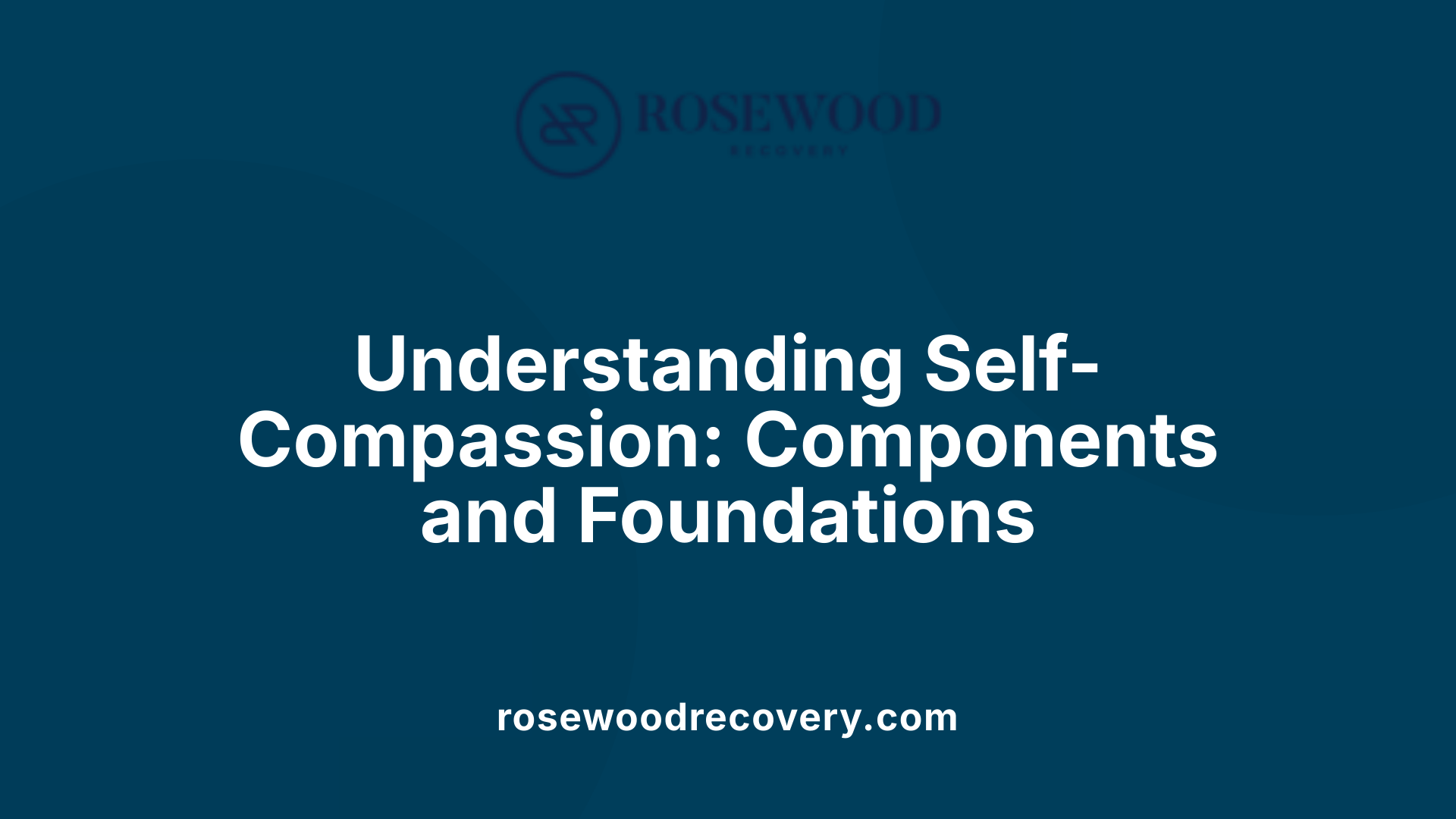
What is self-compassion and what are its main components?
Self-compassion is an emotion-regulation strategy that involves accepting negative feelings with awareness, kindness, understanding, and a sense of common humanity. Rather than criticizing oneself, it encourages treating oneself with the same care and forgiveness one would offer a close friend in difficulty.
Dr. Kristin Neff, a leading researcher in the field, defines self-compassion through three essential components:
Self-Kindness: This involves adopting a forgiving, supportive attitude toward oneself, especially during times of failure or suffering.
Mindfulness: Being fully present in the moment without judgment, recognizing and acknowledging personal struggles without exaggeration or denial.
Shared Humanity: Understanding that suffering and setbacks are universal aspects of the human experience, which helps reduce feelings of isolation.
These components collectively help individuals replace harsh self-criticism with compassion, fostering greater emotional resilience.
Psychologically, self-compassion has been linked with improved emotion regulation, reduced anxiety and depression, lower shame, and increased positive affect. This stands in stark contrast to self-criticism, which often exacerbates negative emotional states and impedes recovery from difficulties such as substance use disorders. By cultivating self-compassion, individuals can better manage setbacks, promote psychological well-being, and boost their capacity for long-term recovery.
The Role of Self-Compassion in Emotion Regulation and Psychological Well-being
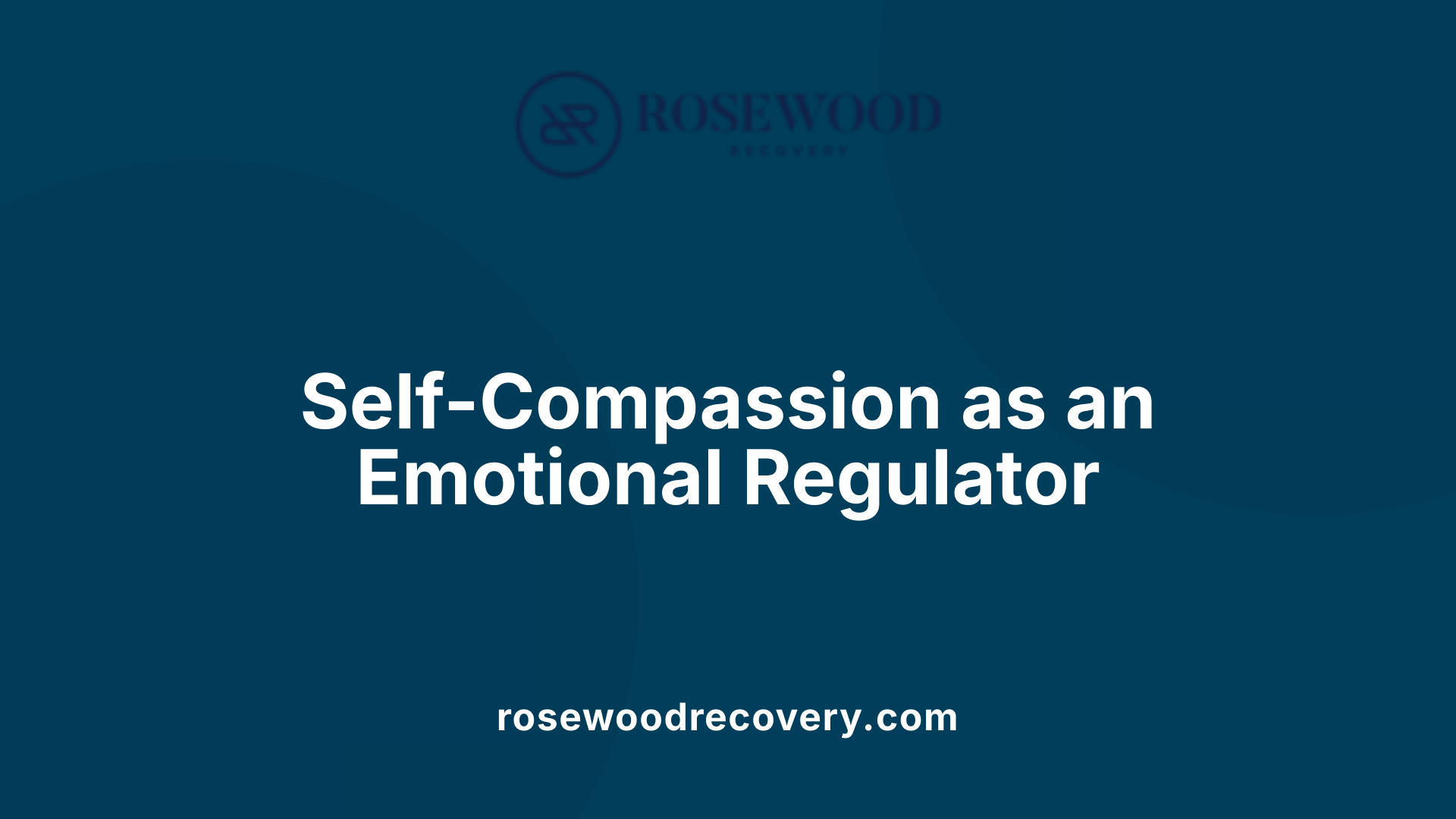
How Does Self-Compassion Mediate Emotion Regulation?
Self-compassion acts as an effective emotion-regulation strategy by promoting acceptance of negative feelings with kindness, mindfulness, and a sense of shared humanity. Rather than judging or suppressing difficult emotions, it enables individuals to acknowledge struggles without self-blame. This fosters adaptive emotional processing that reduces psychological distress.
What Is the Relationship Between Self-Compassion and Emotional Affect?
Empirical studies reveal a positive correlation between self-compassion and positive affect, as well as a negative association with negative affect. This means individuals with higher self-compassion tend to experience more uplifting emotions and fewer negative ones. Such emotional balance broadens cognitive and emotional resources, supporting resilience and long-term recovery.
How Does Self-Compassion Impact Psychological Distress and Thought Suppression?
Research demonstrates that self-compassion significantly predicts lower levels of psychological distress, including depression, anxiety, and stress. It also mediates the relationship between difficulties in emotion regulation and psychological distress, as well as between thought suppression and psychological distress. By reducing maladaptive coping such as thought suppression, self-compassion promotes healthier mental states.
In What Ways Does Self-Compassion Reduce Depression, Anxiety, and Stress?
By encouraging self-kindness and mindfulness, self-compassion decreases self-criticism and feelings of isolation often linked with substance use disorders. This reduction in shame and loneliness lessens symptoms of depression and anxiety. Moreover, self-compassion supports a nurturing internal dialogue that fosters emotional resilience and overall psychological well-being during recovery.
In summary, self-compassion enhances emotion regulation by enabling individuals to face negative emotions gently and without avoidance. This mechanism improves positive emotional experiences, lowers psychological distress, and diminishes maladaptive thought patterns, all of which contribute to better mental health outcomes, especially in the context of substance use recovery.
Self-Compassion’s Influence on Reducing Shame, Guilt, and Loneliness in Addiction Recovery
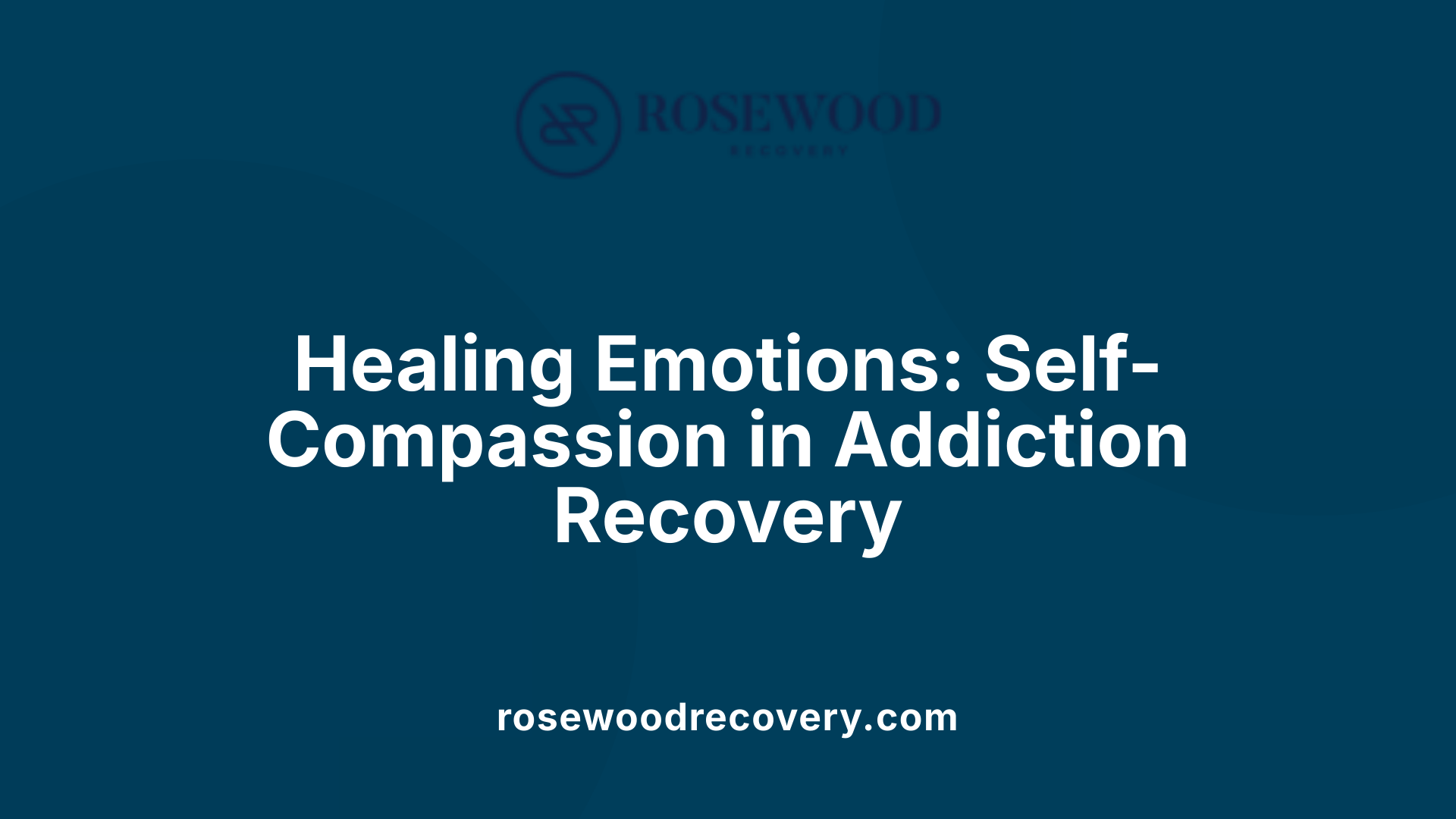
How does self-compassion decrease self-criticism, shame, and loneliness?
Self-compassion involves treating oneself with kindness, understanding, and empathy, especially during difficult times. This approach replaces harsh self-criticism with a forgiving and supportive attitude called self-kindness. By practicing mindfulness, individuals become aware of their struggles without judgment, which helps to prevent spirals of shame or negative self-talk. Additionally, recognizing shared humanity helps reduce feelings of isolation by acknowledging that suffering is a common human experience rather than a personal failure.
What is the relationship between shame and substance use disorders?
Shame is a powerful emotion closely linked to substance use disorders (SUDs). Individuals with SUDs often experience intense self-judgment and feelings of worthlessness, which can exacerbate their condition and hinder recovery efforts. Shame frequently drives maladaptive coping behaviors, including continued substance use, as a way to numb painful emotions. Reducing shame is critical in recovery since persistent shame can fuel relapse and impede emotional healing.
How does self-compassion facilitate emotional healing in addiction recovery?
By fostering self-acceptance and reducing shame and guilt, self-compassion creates a foundation for emotional healing. It encourages individuals to reframe setbacks or relapses as part of the learning process rather than as personal failures. This mindset shift helps manage cravings and triggers without self-blame. As emotional resilience builds, individuals develop patience and kindness toward themselves, which supports sustained sobriety and mental well-being. Self-compassion also promotes social connectedness by lessening feelings of loneliness, which is vital for enduring recovery.
Overall, self-compassion counteracts the destructive emotions commonly faced in addiction recovery. It enables individuals to transform negative emotions into positive ones, fostering personal growth and strengthening recovery capital, essential for healing and long-term wellness.
Building Recovery Capital Through Self-Compassion: Social, Human, and Spiritual Resources

What is Recovery Capital (RC)?
Recovery capital refers to the personal, social, and spiritual resources that individuals can draw upon to initiate and sustain long-term recovery from substance use disorders (SUDs). These resources include social support networks, human capital such as knowledge and coping skills, and spiritual connections that foster meaning and purpose in life.
How Does Self-Compassion Transform Negative Emotions into Positive Ones?
Self-compassion involves accepting negative feelings with kindness, mindfulness, and a sense of shared humanity. This emotion-regulation strategy supports transforming negative emotions like shame and self-criticism into positive emotions such as hope and self-acceptance. By fostering these positive feelings, self-compassion broadens cognitive and emotional resources, enhancing resilience and motivation during recovery.
What Role Do Social Connectedness and Spirituality Play in Recovery?
Social connectedness strengthened through practices common in recovery programs like Alcoholics Anonymous (AA) and Narcotics Anonymous (NA) encourages sharing experiences and mutual support, which promotes self-compassion and reduces feelings of isolation. Spiritual resources, including prayer and meditation, deepen a sense of purpose and interconnectedness, which further supports healing and emotional well-being.
How Does Recovery Capital Facilitate Long-Term Recovery?
Building recovery capital through self-compassion provides a foundation of emotional strength and practical resources needed to manage triggers and cravings. This holistic approach integrates social ties, personal growth, and spiritual health to support sustained sobriety and improved quality of life. Together, these elements create a supportive environment that nurtures long-term wellness and continuous personal development.
Integration of Self-Compassion Practices in Support Groups like AA and NA
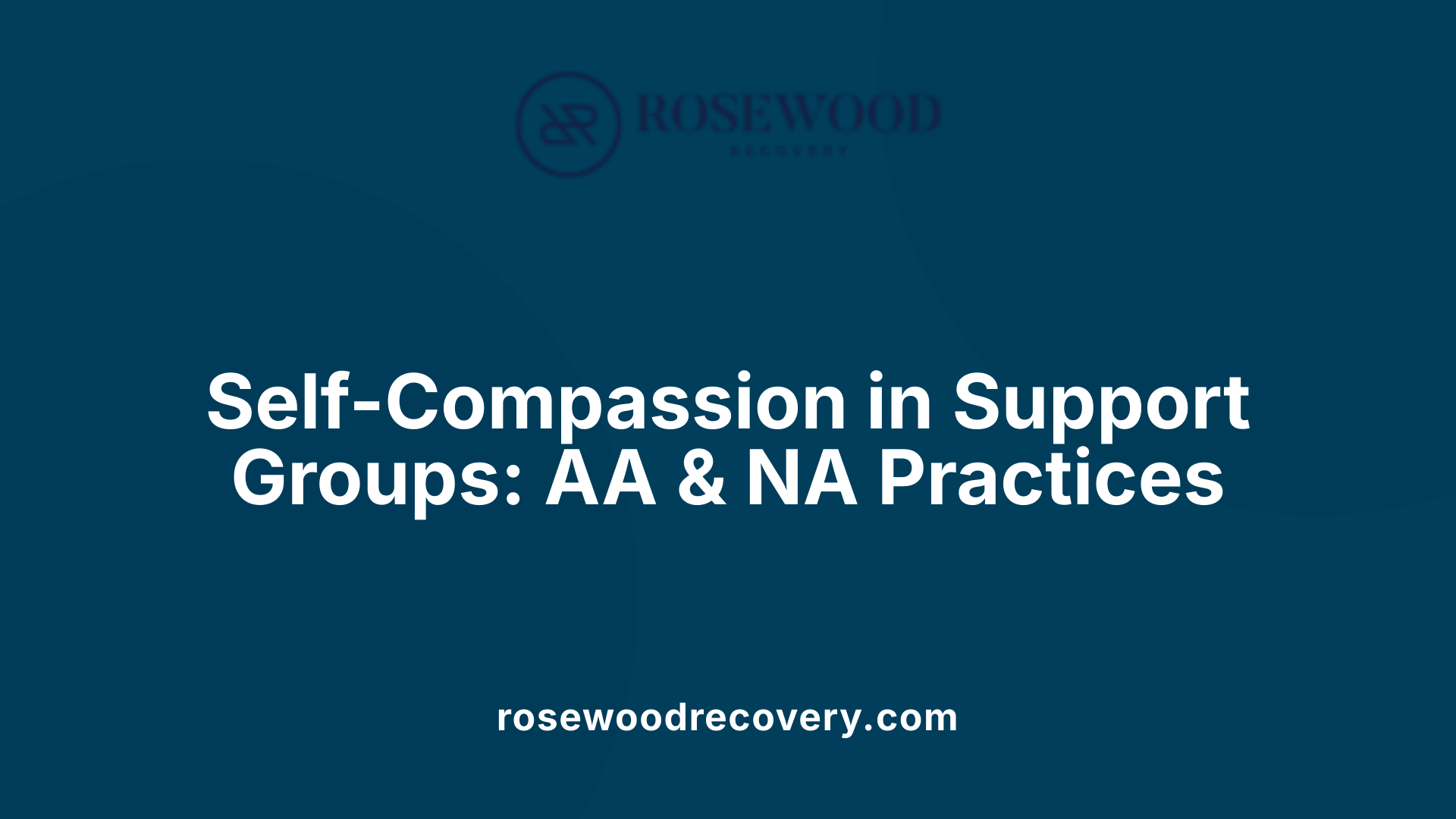
How do mindfulness, prayer, and sharing experiences play a role in AA and NA?
Mindfulness, prayer, and sharing personal experiences are core self-compassion practices embedded within Alcoholics Anonymous (AA) and Narcotics Anonymous (NA). These activities encourage participants to become present with their current feelings without judgment (mindfulness), seek spiritual support and guidance (prayer), and foster a compassionate community by openly discussing struggles and recovery journeys (sharing experiences). Such practices nurture self-kindness and a sense of common humanity, helping members cope with cravings, guilt, and stigma.
What is the relationship between peer support engagement and self-compassion?
Active participation in AA and NA meetings, especially through sharing and making amends, has been linked with increased levels of self-compassion among members. Engaging with peers who have similar experiences fosters connection and understanding, reducing feelings of isolation. This supportive environment helps individuals be gentler with themselves, promoting forgiveness and resilience as they work through addiction challenges.
How does AA/NA involvement affect feelings of shame?
Studies show that involvement in AA and NA correlates with lower shame levels. The groups' emphasis on acceptance and shared human struggles helps decrease self-criticism and guilt often associated with substance use disorders. Reducing shame is crucial because it can otherwise impede recovery by triggering negative emotions and relapse. Building self-compassion in these settings thus supports emotional healing and long-term sobriety.
Comprehensive Treatment Services Incorporating Self-Compassion for Substance Abuse and Mental Health
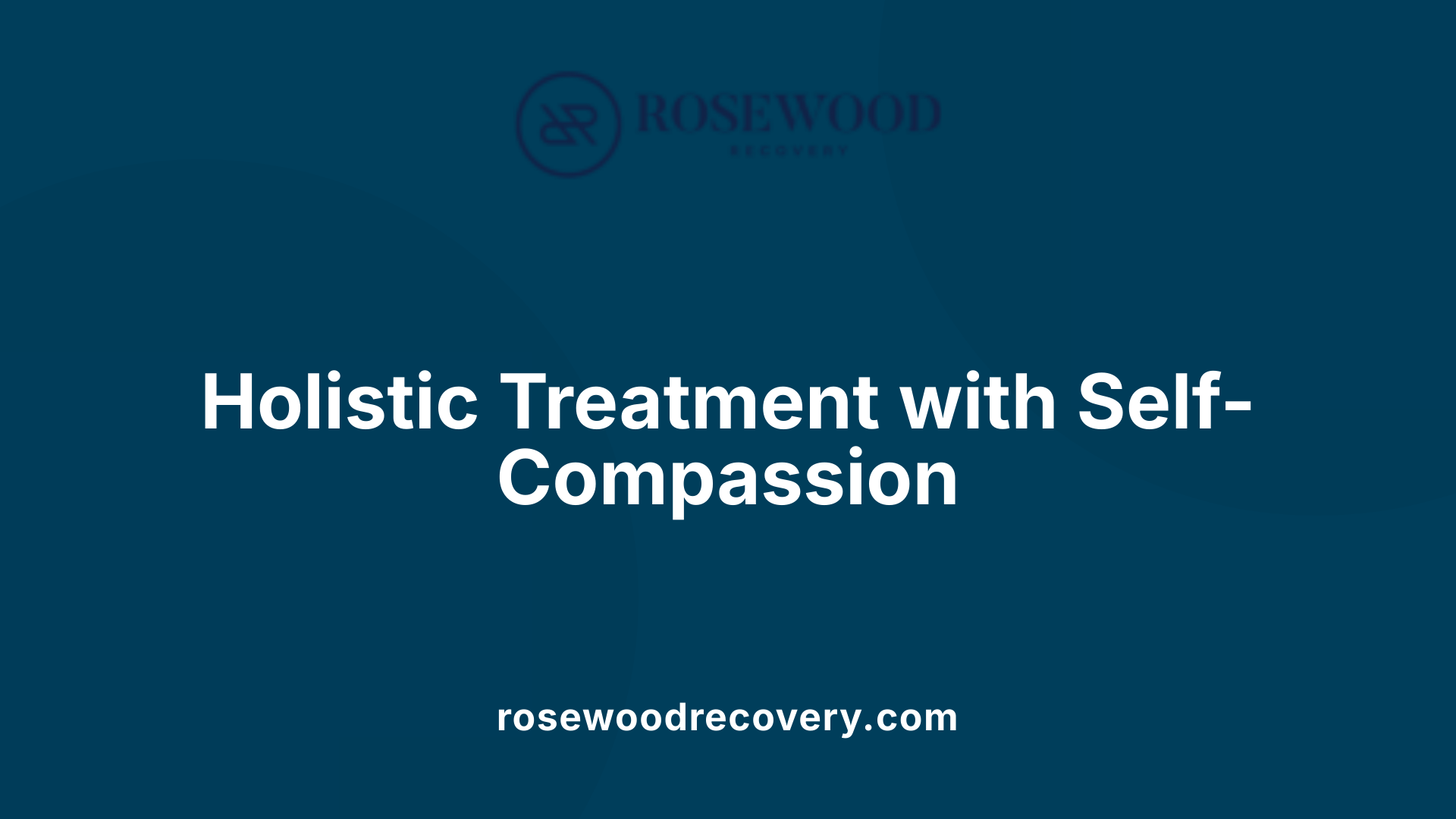
What types of comprehensive treatment services are available for substance abuse and mental health issues?
Comprehensive treatment services for substance use disorders (SUDs) and co-occurring mental health issues include a wide range of interventions tailored to meet individual needs. These services typically involve medical detoxification, outpatient and residential programs, and medication-assisted treatments such as methadone or buprenorphine. Alongside these medical approaches, counseling, behavioral therapies, and structured support groups are essential components. Programs focus on trauma-informed, culturally competent care and often extend to provide ongoing recovery supports like peer coaching and relapse prevention strategies.
How is self-compassion integrated into cognitive-behavioral therapy, mindfulness, and peer support within treatment?
Self-compassion practices are incorporated into these comprehensive services through interventions like cognitive-behavioral therapy (CBT), mindfulness training, and peer support activities. CBT helps patients recognize and alter harmful thought patterns by promoting self-kindness and patience, reducing self-criticism and shame. Mindfulness techniques foster present-moment awareness and nonjudgmental acceptance of difficult feelings, essential elements of self-compassion. Peer support groups, including programs such as Alcoholics Anonymous (AA) and Narcotics Anonymous (NA), encourage sharing experiences, making amends, and cultivating social connectedness, all of which enhance feelings of common humanity and emotional resilience.
What roles do personalized care plans and emotional self-care play in these treatment programs?
Personalized care plans emphasize emotional self-care by integrating self-compassion strategies according to each individual’s unique situation. These plans often include daily practices such as meditation, journaling, and gratitude exercises, alongside setting boundaries and prioritizing health behaviors like sufficient sleep, balanced nutrition, and enjoyable activities. Emotional self-care supports relapse prevention by equipping individuals with tools to manage cravings, triggers, and setbacks with kindness rather than self-judgment. By fostering self-forgiveness and reframing failures as learning opportunities, these tailored interventions promote long-term wellness, self-esteem, and sustained recovery.
| Service Type | Integration of Self-Compassion | Benefits for Recovery |
|---|---|---|
| Cognitive-Behavioral Therapy (CBT) | Encourages self-kindness, reduces self-criticism | Improved emotion regulation, less shame |
| Mindfulness Practices | Enhances present-moment awareness and acceptance | Greater emotional resilience and stress reduction |
| Peer Support Groups (AA, NA) | Promote shared humanity and social connectedness | Decreased isolation, increased motivation |
| Personalized Care Plans | Incorporate daily self-care rituals and boundary setting | Tailored relapse prevention and emotional well-being |
Addressing Co-occurring Substance Abuse and Mental Health Disorders with Integrated Approaches
How do treatment programs address co-occurring substance abuse and mental health disorders?
Treatment programs tackle co-occurring substance abuse and mental health disorders through integrated approaches that address both conditions simultaneously. This comprehensive strategy includes several coordinated elements:
Behavioral Therapies: Treatments such as cognitive-behavioral therapy (CBT) and motivational interviewing are commonly employed. CBT helps individuals recognize and change harmful thought patterns and behaviors related to both their substance use and mental health symptoms. Motivational interviewing supports patients' intrinsic motivation to change by exploring and resolving ambivalence.
Medication Management: When appropriate, pharmacological interventions are used to manage psychiatric symptoms alongside addiction treatment. Coordinated medication management ensures that treatments for mental health disorders are safe and effective alongside substance use disorder care.
Comprehensive Assessment and Care Coordination: Integrated programs emphasize thorough assessment to understand the full clinical picture and then coordinate care across multidisciplinary teams. This holistic view enhances personalized treatment planning.
Family and Social Support: Recognizing the importance of the social environment, programs often involve family members and utilize community resources to foster a supportive network, which is crucial for improving recovery outcomes.
Holistic Care: Programs adopt a holistic approach incorporating psychotherapy, medication, social services, and patient education to improve both psychiatric and substance use outcomes. This approach also addresses related issues such as emotional regulation and coping skills.
Together, these strategies enhance recovery quality of life by effectively managing both disorders concurrently, reducing relapse risks, and building resilience and self-compassion among patients.
The Spectrum of Addictions Treated by Comprehensive Programs and the Role of Self-Compassion
What are the various forms of addiction that comprehensive treatment services can address?
Comprehensive addiction treatment programs cater to a broad range of substance and behavioral addictions. Substance addictions typically treated include alcohol, opioids, stimulants, and sedatives. Beyond substances, these programs also address behavioral addictions such as gambling, excessive internet use, compulsive food intake, sex addiction, shopping, and gaming.
Tailoring treatment to individual needs
These services emphasize individualized care, tailoring therapeutic strategies to each person's unique patterns of addiction and recovery needs. This customization typically involves a combination of behavioral therapies, medication-assisted treatment when appropriate, active family involvement, and integrated mental health care. Aftercare supports and relapse prevention strategies are also key components to ensure sustainable recovery.
Incorporation of self-compassion principles and holistic therapies
Self-compassion forms a foundational element within many comprehensive addiction programs. Encouraging individuals to treat themselves with kindness, understanding, and forgiveness aids emotional regulation and resilience during recovery. Programs often incorporate mindfulness, prayer, meditation, and sharing experiences — practices that foster self-compassion and diminish shame and self-criticism.
Holistic therapies such as yoga, art therapy, and outdoor activities complement these self-compassionate approaches. This integration supports the rebuilding of recovery capital by enhancing physical, spiritual, emotional, and social resources.
Therapeutic techniques complementing self-compassion
Cognitive-behavioral therapy (CBT) is commonly employed to identify and restructure harmful thought patterns, including self-criticism, promoting kinder internal dialogue. Peer support and group therapies found in programs like Alcoholics Anonymous and Narcotics Anonymous further embed self-compassion into communal recovery frameworks. These multifaceted approaches strengthen the individual's emotional well-being and social connectedness, crucial for long-term recovery maintenance.
Role and Impact of Counseling and Behavioral Therapies in Enhancing Self-Compassion during Recovery
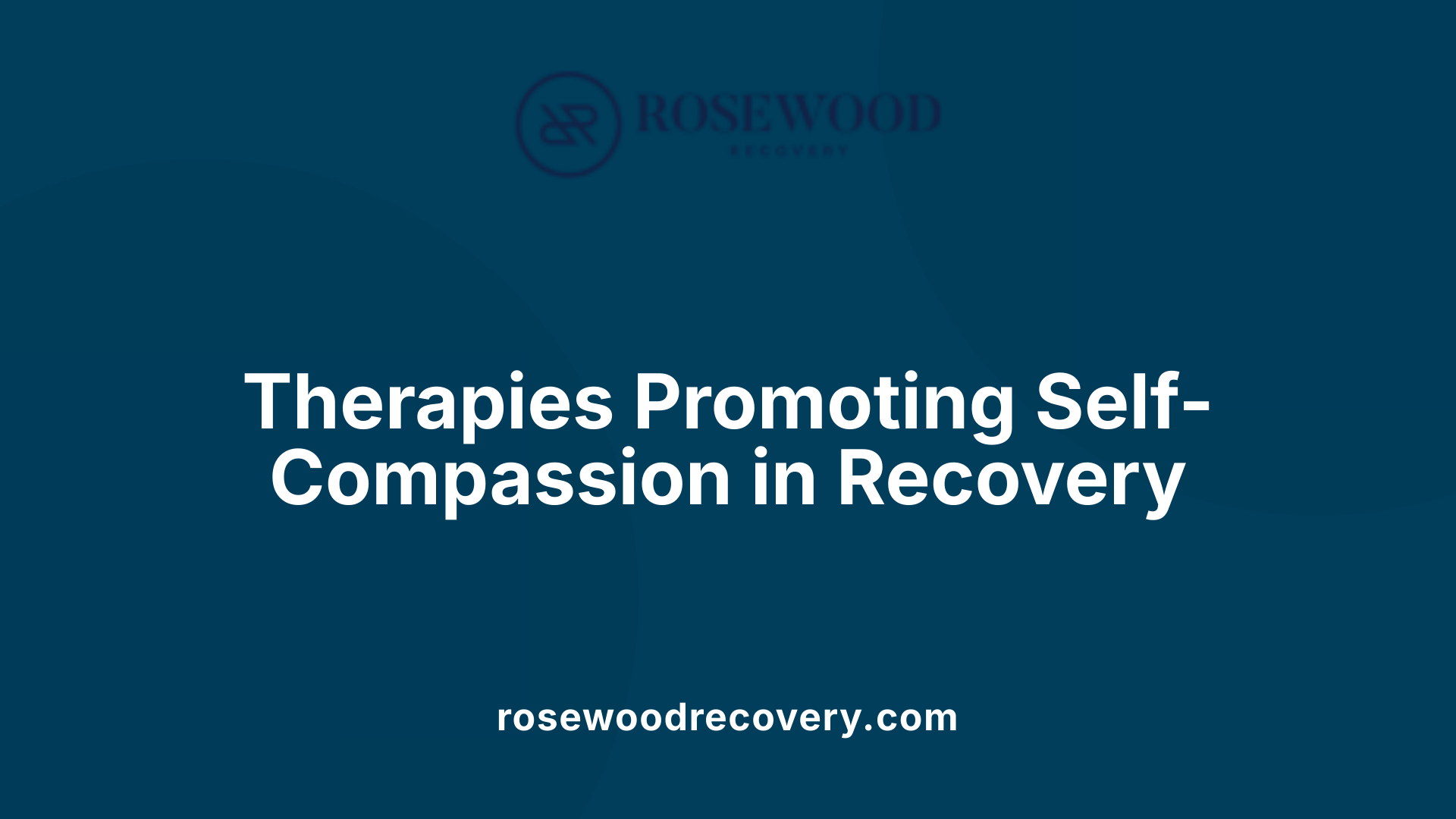
What role do counseling and behavioral therapies play in addiction treatment?
Counseling and behavioral therapies are fundamental in addiction treatment, offering safe and supportive environments that help individuals address the roots of their addiction. These therapies assist in developing coping mechanisms, reshaping harmful behaviors, and preventing relapse. Through structured sessions, individuals learn to manage cravings and emotional triggers by fostering self-awareness and self-compassion.
Counseling techniques that promote self-compassion
Techniques such as mindfulness exercises, self-reflective journaling, and guided imagery within counseling sessions encourage individuals to treat themselves with kindness and understanding. These strategies help reduce self-criticism and shame, which are common in addiction recovery, by nurturing patience and empathy toward oneself, essential for healing.
Cognitive-behavioral therapy and motivational interviewing
Cognitive-behavioral therapy (CBT) plays a vital role in promoting self-compassion by helping individuals recognize and reframe negative thought patterns into nurturing, positive self-talk. Motivational interviewing further supports this by fostering a non-judgmental dialogue that enhances readiness to change and reinforces self-acceptance.
Group therapy dynamics fostering vulnerability and honesty
Group therapy creates a community where sharing experiences openly promotes vulnerability and honest self-expression. This environment fosters a sense of shared humanity, reinforcing that setbacks and struggles are part of the collective recovery journey. The mutual support within groups helps alleviate feelings of isolation and builds emotional resilience through compassionate peer interactions.
Therapeutic alliance and personalized treatment planning
A strong therapeutic alliance between the counselor and individual is critical. Trust and empathy in this relationship encourage active engagement and openness. Personalized treatment plans, which integrate psychological and physical aspects of addiction, ensure that self-compassion practices are tailored to individual needs, nurturing sustained recovery and emotional well-being.
Self-Compassion in Early Recovery: Reducing Self-Judgment and Managing Setbacks

How does self-compassion help reframe failures as learning opportunities?
In the early stages of recovery, individuals often face setbacks that can trigger harsh self-judgment and feelings of failure. Self-compassion offers a supportive mindset by encouraging treatment of oneself with kindness and understanding—akin to how one would treat a close friend facing difficulty. This approach helps individuals reframe failures, not as defining shortcomings but as valuable learning experiences that contribute to growth. By reducing self-criticism and shame, self-compassion creates space for personal insight and forgiveness, which are essential for sustained motivation.
How does self-compassion assist in managing cravings and triggers?
Cravings and triggers are challenging aspects of recovery that can provoke intense negative emotions and self-blame. Through self-compassion, individuals are encouraged to acknowledge these experiences mindfully and without judgment. This non-reactive awareness allows cravings to be recognized as temporary and manageable, reducing the urge to respond with harmful behaviors. The practice of kindness toward oneself during these moments supports emotional regulation and diminishes the tendency toward coping-motivated substance use.
In what ways does self-compassion build resilience through kindness and patience?
Resilience in recovery involves the capacity to bounce back from setbacks and maintain wellness over time. Self-compassion fosters this resilience by promoting patience and gentle self-care. Treating oneself with kindness during difficult moments helps to soften internal harshness and fosters emotional endurance. Patience, especially during phases such as detoxification where progress cannot be rushed for safety, prevents frustration and supports a steady recovery process. Together, kindness and patience create a stable foundation from which individuals can recover and grow stronger.
Why is patience crucial during withdrawal and detoxification phases?
Withdrawal and detoxification are inherently difficult, and their duration and effects cannot be accelerated safely. Patience during these times is vital for enduring physical and emotional discomfort without becoming overwhelmed or discouraged. Embracing patience supports individuals in maintaining focus on their healing trajectory, preventing harmful thought patterns such as self-punishment. Programs like those at Driftwood Recovery emphasize the role of patience alongside self-compassion, helping patients to accept the process and sustain hope despite the inevitable challenges of early recovery.
Self-Forgiveness and Its Complementary Role alongside Self-Compassion in Alcohol Use Disorder Recovery
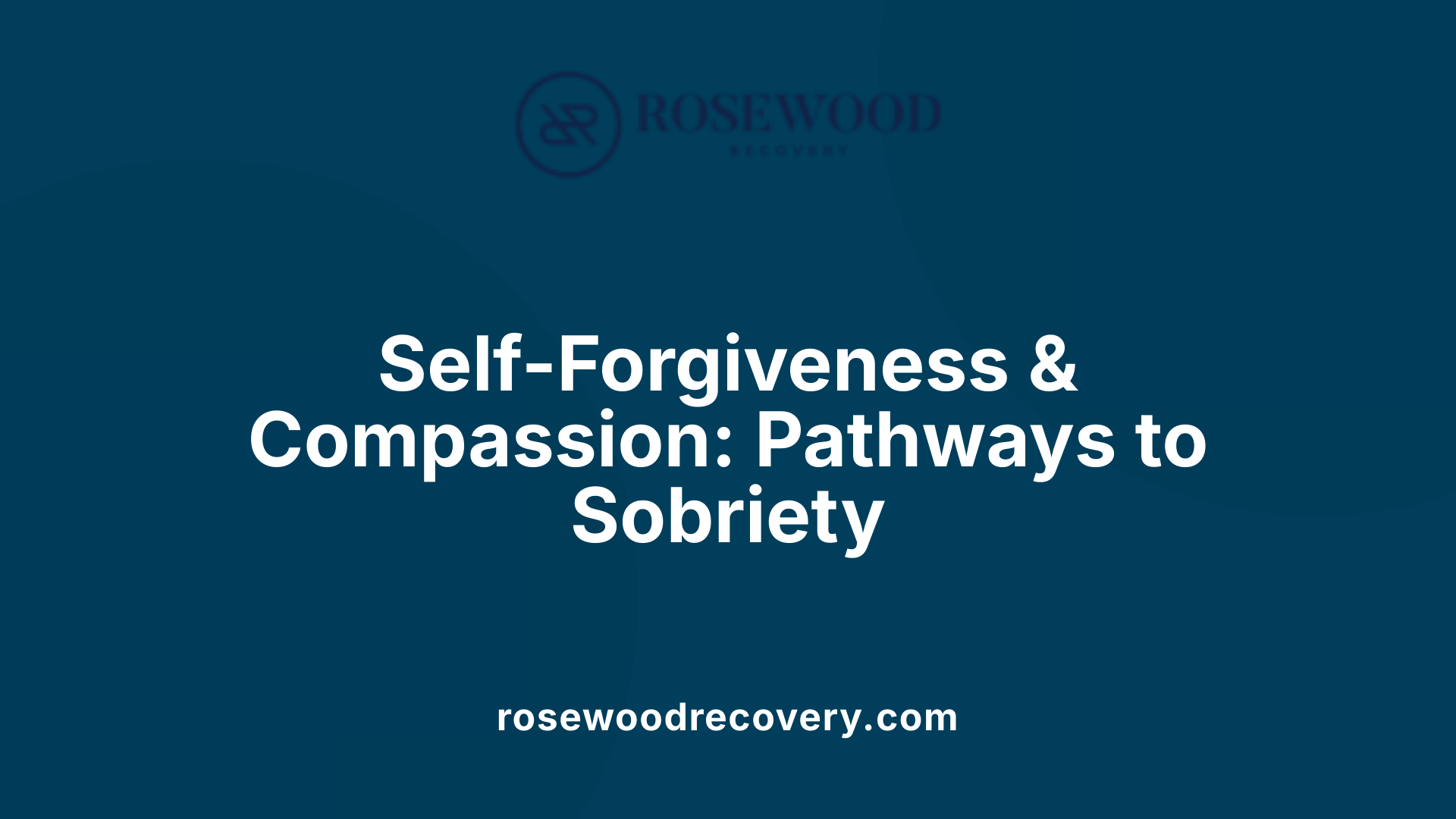
What Are the Differences and Similarities between Self-Compassion and Self-Forgiveness?
Both self-compassion and self-forgiveness play significant roles in recovery from alcohol use disorder (AUD). Self-compassion involves treating oneself with kindness, mindfulness, and an understanding of shared human experience during hardship. In contrast, self-forgiveness specifically focuses on releasing self-blame and guilt related to past mistakes. While self-compassion supports emotional acceptance and reduces self-criticism broadly, self-forgiveness directly addresses negative self-focused emotions such as guilt and shame.
How Do Self-Forgiveness-Based Interventions Affect Drinking Outcomes?
Research indicates that interventions targeting self-forgiveness can improve outcomes related to alcohol consumption. These programs often help individuals decrease problem drinking by teaching adaptive coping strategies that mitigate shame and guilt. Studies show self-forgiveness tends to increase significantly during alcohol treatment, leading to lower relapse rates and better recovery maintenance.
How Does Self-Forgiveness Reduce Shame and Guilt?
Self-forgiveness reduces the heavy burden of negative emotions tied to past behavior. By promoting acceptance and releasing harsh judgment, it alleviates shame and guilt—emotions known to trigger harmful drinking patterns. The reduction of these feelings creates psychological space for positive affect and self-acceptance, which are crucial in sustaining recovery.
What Is the Potential Synergy of Self-Compassion and Self-Forgiveness in Treatment?
While research into their combined effects is limited, self-compassion and self-forgiveness likely complement each other in supporting recovery. Together, they foster emotional regulation, resilience, and social connectedness. Self-compassion broadens emotional resources and promotes mindfulness, while self-forgiveness targets release from past self-condemnation. This synergy may enhance treatment efficacy by addressing both ongoing emotional challenges and specific forgiveness-related barriers.
| Aspect | Self-Compassion | Self-Forgiveness | Combined Effect |
|---|---|---|---|
| Focus | Kindness, mindfulness, shared humanity | Releasing guilt and shame related to past actions | Broad emotional support with targeted relief from self-blame |
| Emotional Impact | Reduces self-criticism, shame, loneliness | Specifically reduces guilt and shame | Enhanced emotional regulation and psychological relief |
| Role in Recovery | Improves emotion regulation and resilience | Decreases relapse triggers linked to negative self-feelings | Supports sustained abstinence and mental well-being |
| Intervention Approach | Mindfulness, kindness practices | Forgiveness-focused therapy | Integrated strategies for holistic recovery |
Empirical Evidence Supporting Self-Compassion's Role in Addiction Recovery Outcomes
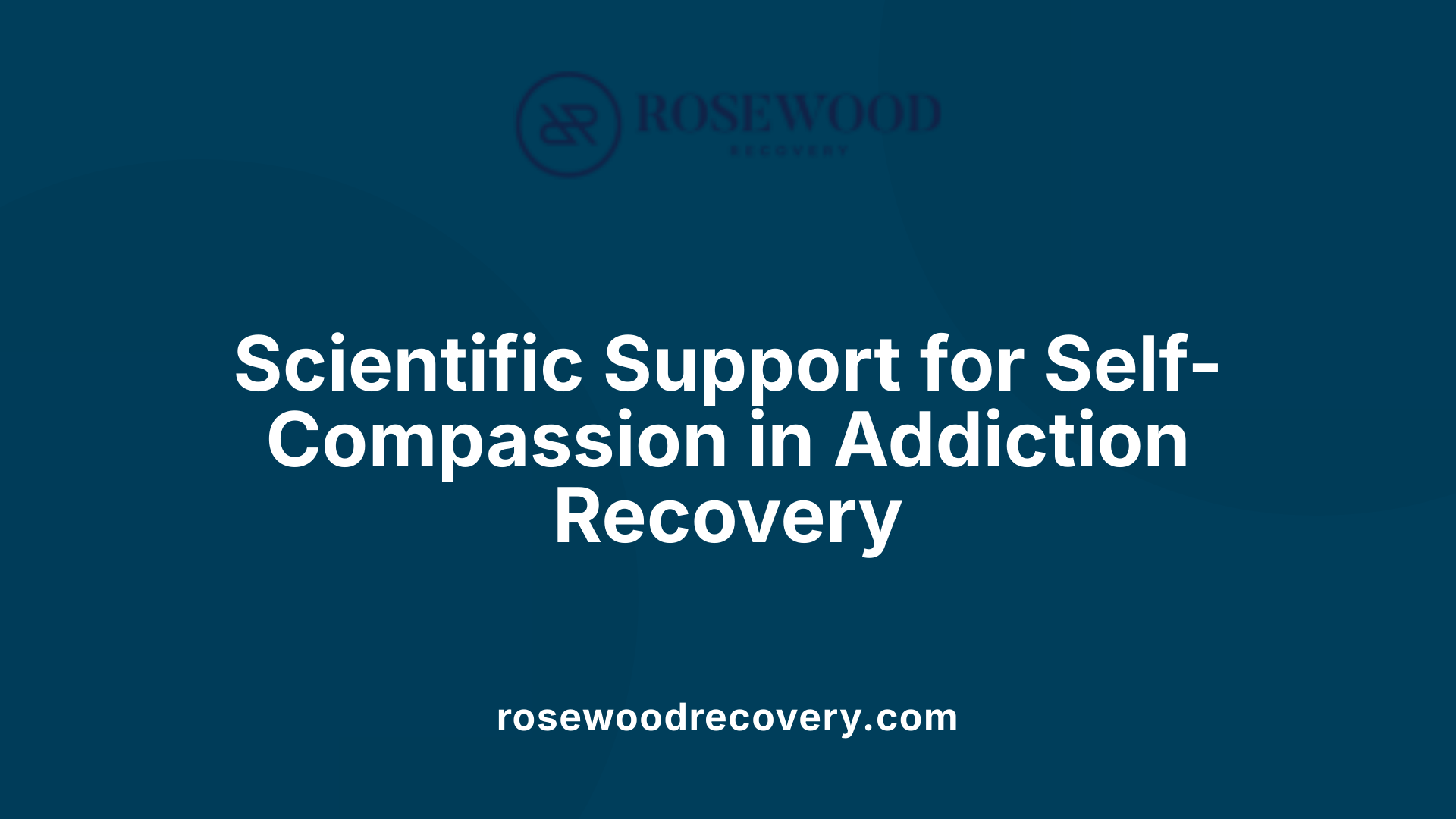
How Does Self-Compassion Correlate with Psychological Distress in Recovery?
Research consistently shows that higher levels of self-compassion are linked with significantly lower psychological distress among individuals recovering from substance use disorders (SUDs). A study found strong negative correlations between self-compassion and difficulties in emotion regulation (rs = -0.55), psychological distress (rs = -0.53), and thought suppression (rs = -0.43). This evidence highlights self-compassion's role in alleviating mental health challenges often experienced during addiction recovery.
Does Self-Compassion Mediate the Relationship Between Emotion Regulation Difficulties and Psychological Distress?
Yes, self-compassion serves as a mediator reducing psychological distress caused by difficulties in emotion regulation and thought suppression. It helps individuals process challenging emotions without harsh self-judgment, which can otherwise exacerbate distress. The mediating effect of self-compassion suggests that it improves emotional resilience by facilitating a kinder, more mindful response when facing internal struggles.
In What Ways Does Self-Compassion Improve Emotion Regulation and Reduce Thought Suppression?
Self-compassion promotes adaptive emotion regulation strategies by encouraging mindfulness and acceptance of negative feelings without avoidance. This reduces the tendency to suppress distressing thoughts, a behavior linked to poorer mental health outcomes. By fostering awareness and kindness towards one’s difficulties, self-compassion helps in managing cravings and triggers, decreasing the risk of relapse.
How Does Self-Compassion Support Adaptive Coping and Relapse Prevention?
Self-compassion aids individuals in coping with negative emotions proactively, reducing reliance on substances to manage stress or trauma-related feelings. By decreasing shame, self-criticism, and self-blame, it allows for healthier emotional processing and encourages seeking social support. These factors contribute to building recovery capital and sustaining long-term sobriety.
| Aspect | Evidence Summary | Implications for Recovery |
|---|---|---|
| Psychological Distress | Negative correlation with self-compassion | Lower distress supports better recovery outcomes |
| Emotion Regulation | Self-compassion mediates emotion regulation effects | Enhances resilience and emotional management |
| Thought Suppression | Reduced suppression linked to higher self-compassion | Encourages healthier coping and reduces relapse |
| Adaptive Coping & Relapse | Promotes kindness, reduces shame, and boosts support | Strengthens long-term sobriety and well-being |
Daily Practices and Rituals to Foster Self-Compassion in Recovery
Mindfulness Exercises Like Meditation, Yoga, Deep Breathing
Mindfulness practices are foundational in cultivating self-compassion during addiction recovery. Techniques such as meditation, yoga, and deep breathing encourage individuals to stay present and acknowledge difficult emotions without judgment. These exercises help manage overwhelming feelings and reduce impulsive reactions, supporting emotional regulation crucial for early and sustained recovery.
Journaling and Practicing Gratitude
Keeping a journal allows individuals to reflect on their recovery journey, celebrate small victories, and monitor personal growth. Writing about experiences enhances self-awareness and reinforces a positive mindset. Practicing gratitude daily shifts focus from setbacks to strengths, fostering resilience and uplifting emotional well-being.
Positive Self-Talk Replacing Harsh Self-Criticism
Replacing negative internal dialogue with encouraging and kind language helps reduce self-criticism and shame. Self-compassion involves treating oneself with the same understanding one would offer a close friend. This transformation in self-talk nurtures confidence, lowers feelings of isolation, and supports motivation to maintain sobriety.
Physical Self-Care Routines Supporting Emotional Well-Being
Physical health habits such as balanced nutrition, regular exercise, and sufficient sleep are vital components of self-compassion. These routines not only improve mood but also build resilience against stress and cravings. Incorporating enjoyable physical activities can enhance overall wellness and aid in recovery stability.
By integrating these daily practices and rituals, individuals nurture self-compassion that empowers healing, emotional regulation, and long-term sobriety.
Community Support and Social Connections as Extensions of Self-Compassion in Recovery
Role of Therapy Groups, Support Networks, and Personal Relationships
Engagement in therapy groups and support networks such as Alcoholics Anonymous (AA) and Narcotics Anonymous (NA) plays a critical role in cultivating self-compassion during recovery. These groups provide a supportive environment where individuals can share their experiences and challenges without judgment. Such participation helps reduce feelings of isolation and shame, fostering a sense of common humanity, which is a core component of self-compassion.
Personal relationships also contribute significantly by offering emotional support, encouragement, and accountability. Reconnecting with family and friends can create a strong social support system that bolsters emotional resilience.
Volunteering and Community Involvement to Foster Empathy
Volunteering and community involvement extend self-compassion beyond the individual, encouraging empathy and compassion for others. When individuals in recovery engage in community activities, they experience a sense of purpose and connectedness. This outward focus on helping others can enhance self-forgiveness and reduce self-criticism by shifting attention from personal struggles to collective well-being.
These activities nurture recovery capital by building social bonds that support sustained recovery and provide meaningful interactions that reinforce positive self-concepts.
Rebuilding Damaged Relationships through Understanding and Responsibility
Addiction often damages relationships, but self-compassion fosters the understanding and responsibility needed for repair. When individuals apply kindness and forgiveness toward themselves, they become better equipped to acknowledge harm caused to others without harsh self-judgment.
This process supports making amends, a common practice in 12-step programs, facilitating healing for both the individual and their loved ones. By embracing shared humanity, individuals recognize that setbacks are a universal experience, reducing isolation and encouraging reconciliation.
Social Connectedness Enhancing Emotional Resilience
Social connectedness developed through therapy, support groups, volunteering, and repaired personal relationships strengthens emotional resilience. It cultivates feelings of belonging, reduces loneliness, and supports adaptive emotion regulation.
This network of support mitigates relapse risk by providing coping resources and fostering positive affect. Ultimately, the integration of community support into recovery promotes sustained wellness by reinforcing self-compassion practices both internally and externally.
Holistic and Multidimensional Approaches Integrating Self-Compassion in Recovery Programs
How Are Various Treatments Combined in Holistic Addiction Recovery?
Holistic recovery programs integrate medical treatment, psychotherapy, and peer support to foster comprehensive healing. Medical interventions often address the physical dependencies and withdrawal management, ensuring patient safety and stabilization. Psychotherapy, especially cognitive behavioral therapy (CBT), targets underlying psychological patterns promoting addiction, helping patients develop healthier coping mechanisms.
Peer support groups provide social connectedness and shared experience, essential for cultivating self-compassion and reducing feelings of isolation. Programs like Alcoholics Anonymous (AA) and Narcotics Anonymous (NA) incorporate self-compassion practices such as sharing experiences and making amends, nurturing recovery capital that sustains long-term sobriety.
How Are Mindfulness, CBT, and Personalized Care Employed?
Mindfulness practices encourage present-moment awareness and emotional regulation without judgment, aligning with self-compassion principles. These include meditation, yoga, journaling, and breathing exercises, all helping individuals manage cravings and negative emotions.
CBT techniques focus on recognizing and reframing harmful thought patterns, replacing self-criticism with kindness and understanding. Personalized care plans tailor interventions according to individual needs, addressing unique psychological, behavioral, and social factors affecting recovery.
What Physical, Psychological, and Social Dimensions Are Addressed?
Recovery extends beyond abstinence to a multidimensional process involving:
- Physical aspects: Balanced nutrition, adequate sleep, and physical activity improve mood and resilience.
- Psychological aspects: Emotional regulation, reducing shame and self-blame, and fostering self-forgiveness support mental well-being.
- Social aspects: Building supportive relationships, community involvement, and strengthening social networks aid emotional healing and reduce loneliness.
How Are Harm Reduction and Pharmacological Interventions Integrated as Self-Care?
Harm reduction strategies acknowledge the ongoing challenges in addiction recovery by minimizing risks associated with substance use. Pharmacological interventions, such as methadone maintenance therapy, are incorporated as vital self-care measures, especially when access to formal treatment is limited.
Such approaches complement psychological and social treatments, enabling individuals to maintain stability while developing self-compassion and recovery capital. This integration reflects a compassionate, patient-centered framework recognizing recovery as a personal, gradual journey.
| Recovery Component | Examples | Role in Self-Compassion and Recovery |
|---|---|---|
| Medical Treatment | Detox, pharmacotherapy (e.g., methadone) | Addresses physical dependence, stabilizes health |
| Psychotherapy | Cognitive Behavioral Therapy | Modifies harmful thoughts, promotes kindness and self-forgiveness |
| Mindfulness Practices | Meditation, journaling, yoga | Cultivates emotional regulation and present-moment awareness |
| Peer Support | AA, NA, community groups | Builds social connectedness, reduces isolation |
| Personalized Care Plans | Tailored interventions according to needs | Enhances relevance and effectiveness of recovery support |
| Harm Reduction | Safe use strategies, pharmacological aids | Supports safer behaviors, complements psychological recovery |
| Physical & Psychological Care | Nutrition, sleep, exercise, emotional health | Boosts resilience, reduces shame and self-criticism |
Overcoming Guilt and Shame in Recovery through Patience and Self-Compassion
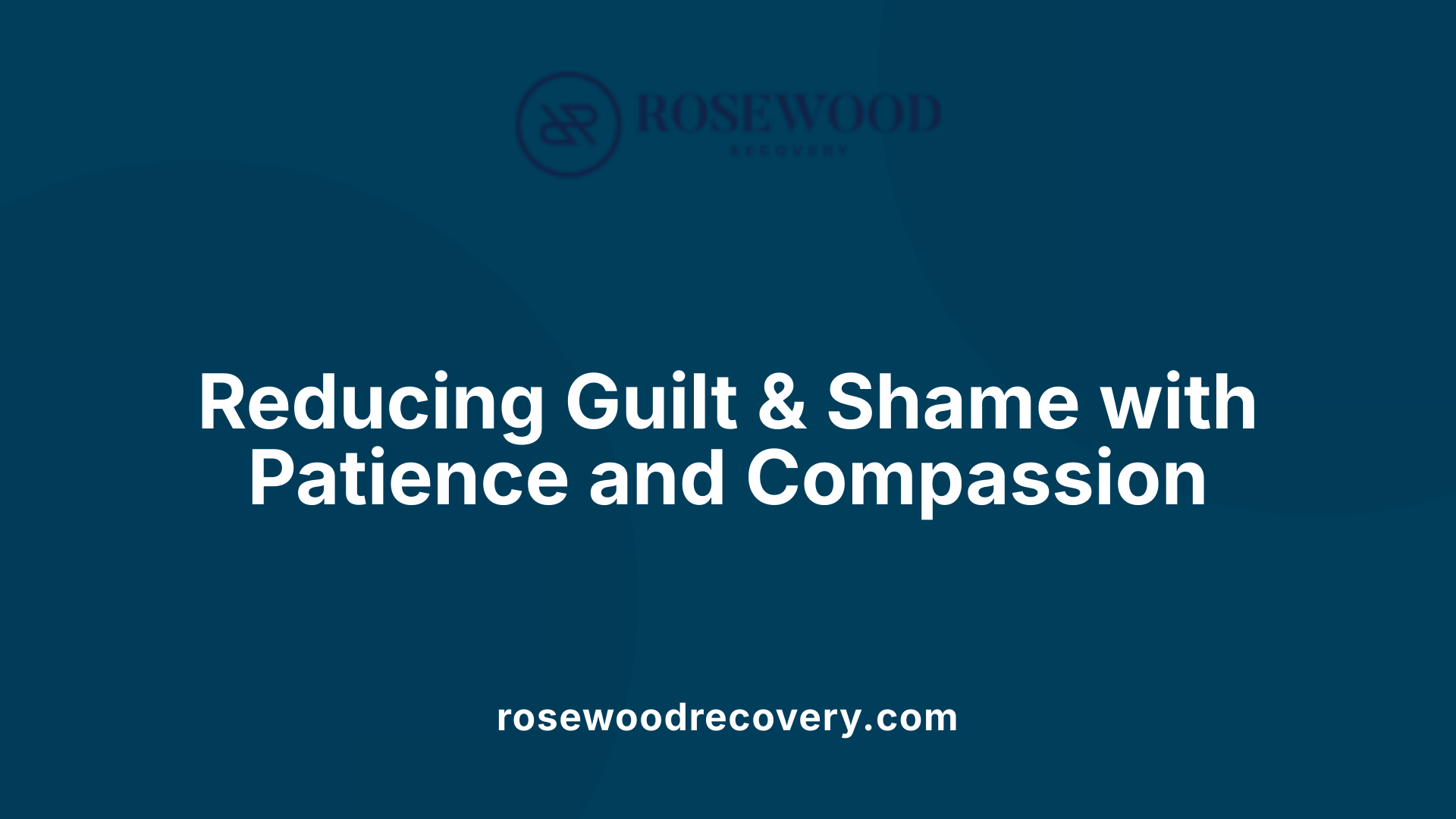
How does self-compassion prevent self-punishment and harmful thought patterns?
Self-compassion encourages treating oneself with kindness and understanding, especially during challenging times. By fostering a forgiving and supportive attitude, it helps individuals avoid harsh self-criticism and self-punishment. This emotional approach reduces feelings of guilt and shame, which are common obstacles during recovery from substance use disorders (SUDs). Instead of escalating negative self-judgments, self-compassion nurtures courage and self-worth necessary for healing.
Why is patience important during detox and withdrawal?
Patience plays a critical role throughout detoxification and withdrawal phases. These processes cannot be rushed due to safety concerns and physiological requirements. Cultivating patience allows individuals to endure discomfort without frustration or despair. Understanding that recovery is a gradual journey helps reduce anxiety and fosters acceptance of the necessary time frames for healing. This endurance supports emotional stability and reduces relapse risk.
How can setbacks be recognized as part of growth?
Setbacks in recovery are often viewed as failures, but with self-compassion, they can be reframed as learning opportunities. This perspective shift reduces the stigma around relapse or mistakes, promoting resilience and perseverance. Rather than harsh self-judgment, individuals are encouraged to reflect on their progress, identify triggers, and adjust coping strategies, thus facilitating continuous growth.
How does patience and self-compassion encourage hope and receptivity to help?
By replacing self-criticism with kindness, patience and self-compassion inspire hope during recovery. These values help individuals remain open to receiving support and assistance from others without shame or resistance. Embracing setbacks as part of the healing journey nurtures motivation to continue seeking help and engaging in treatment. This fosters a positive mindset vital for sustained recovery.
Participants in comprehensive treatment programs like those at Driftwood Recovery emphasize these qualities to build emotional resilience and maintain motivation. Community involvement, therapy, and ongoing support reinforce patience and self-compassion, creating a nurturing environment conducive to healing.
Aftercare Planning: Sustaining Recovery with Continued Emphasis on Self-Compassion
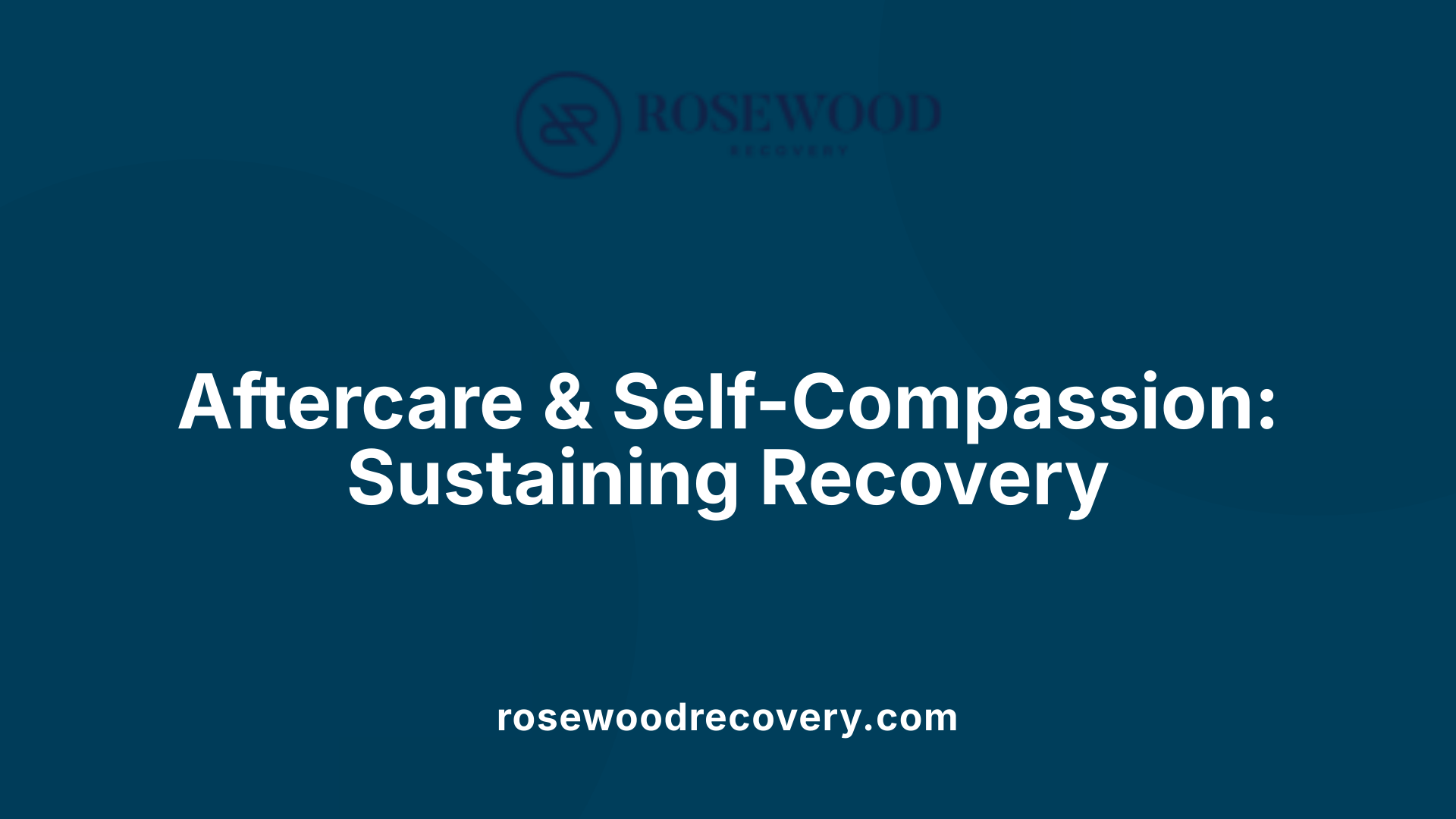
How important is aftercare planning in maintaining recovery from addiction and mental health disorders?
Aftercare planning is crucial in supporting long-term recovery from addiction and mental health disorders. It provides continuous care and relapse prevention strategies that help individuals adapt their lifestyle and coping mechanisms in a supportive environment. Effective aftercare reduces the risk of relapse by offering resources and guidance tailored to each person’s recovery journey.
What types of aftercare services support ongoing recovery?
Common aftercare services include:
- Outpatient therapy: Provides ongoing counseling and skills development to manage triggers and stress.
- Support groups: Such as Alcoholics Anonymous (AA) and Narcotics Anonymous (NA), which promote sharing, accountability, and social connection.
- Sober living environments: Structured, drug-free settings that foster community support and stability.
These options cater to individual recovery needs, offering flexible and accessible support.
How do mobile health interventions and care continuity improve aftercare?
Mobile health tools and digital psychological self-care (DPSC) platforms enable individuals to engage in self-care independently. They provide reminders, educational content, and facilitate communication with care teams. Continuity of care through these technologies enhances accessibility, allowing ongoing monitoring and support even after formal treatment ends, which improves recovery outcomes.
How does self-compassion support adherence to aftercare and boost resilience?
Self-compassion plays a vital role in sustaining recovery during aftercare:
- It encourages kindness and patience with oneself when facing challenges, reducing self-criticism and shame.
- By transforming negative emotions into positive ones, self-compassion fosters motivation to continue aftercare activities.
- It builds emotional resilience, helping individuals cope with cravings, setbacks, and stressful emotions without relapse.
- Self-compassion enhances social connectedness, supporting engagement in group therapy and community resources.
Together, these effects make self-compassion an essential element in maintaining long-term sobriety and mental well-being through aftercare.
Addressing Structural and Social Barriers Through Self-Care and Self-Compassion in Recovery
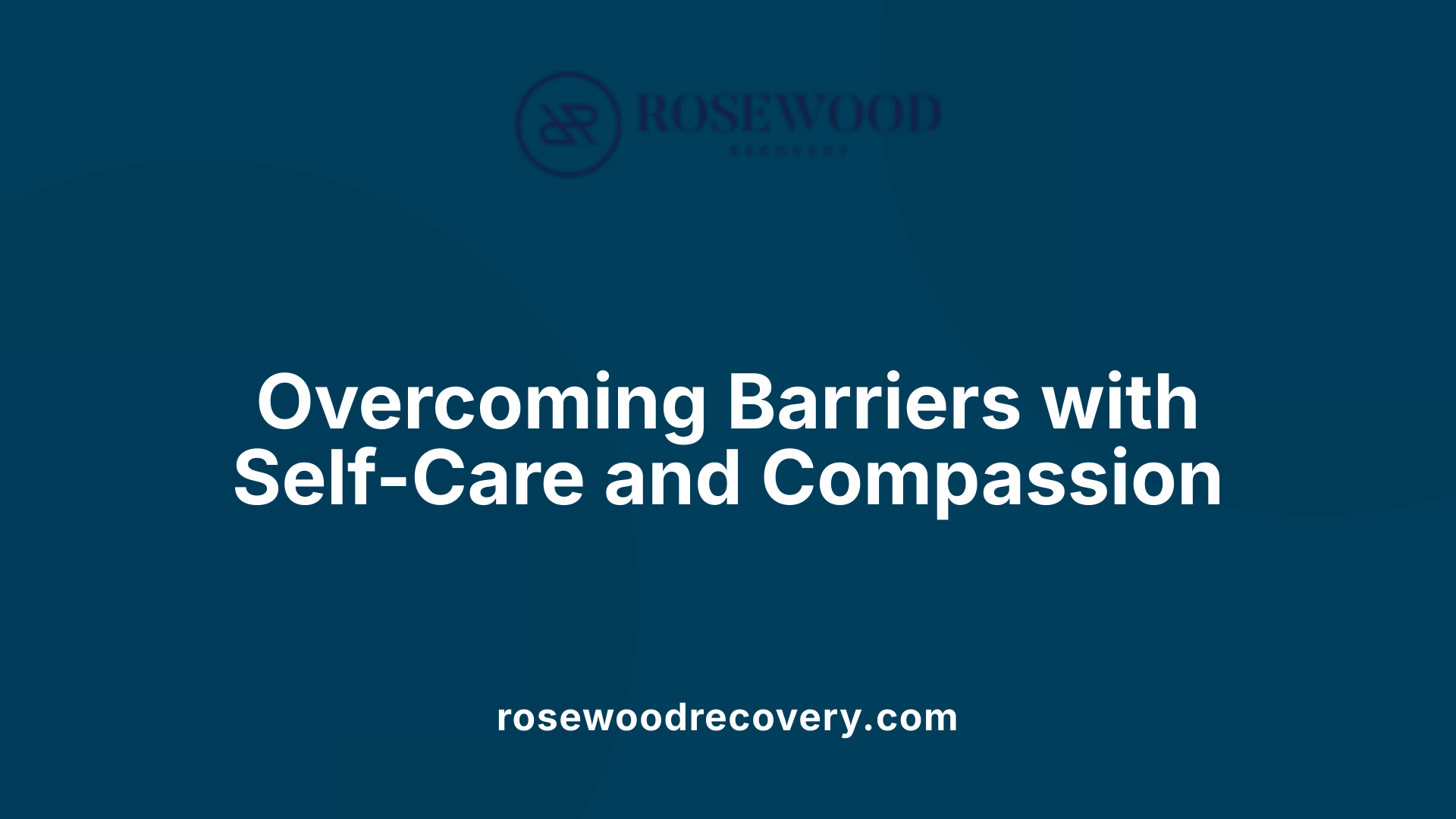
How do social, occupational, and environmental factors impact recovery?
Recovery from substance use disorders (SUDs) extends beyond individual effort—it is deeply influenced by social, occupational, and environmental factors. Structural barriers such as stigma, limited access to healthcare, workplace pressures, and unstable living situations can hinder emotional well-being and disrupt sustained sobriety. Recognizing these challenges is crucial because they affect one's ability to engage fully in recovery processes. For example, social isolation can increase feelings of shame and self-criticism, while occupational stress may trigger relapse.
Why is tailoring self-care strategies to individual needs important?
Effective self-care in recovery must be personalized. Every individual's circumstances—cultural background, social supports, mental health status, and personal preferences—shape their recovery journey. Tailored strategies empower individuals to manage triggers, improve resilience, and foster emotional regulation within their unique life contexts. This personalized approach acknowledges that what works for one may not suit another, ensuring self-care practices are relevant and sustainable.
How do digital tools support psychological self-care?
Advancements in digital technology provide accessible means for psychological self-care. Online cognitive-behavioral therapy modules and digital psychological self-care (DPSC) platforms allow individuals to practice mindfulness, emotion regulation, and coping skills independently at their own pace. These tools can bridge the gap for those facing barriers to in-person treatment, offering flexible, confidential, and continuous support that complements traditional recovery programs.
What role does harm reduction play in comprehensive self-care?
Harm reduction strategies, including the use of pharmacological interventions like methadone, are vital components of comprehensive self-care, especially when formal treatment access is limited. These approaches focus on minimizing negative health and social consequences associated with substance use rather than solely on abstinence. Harm reduction respects the individual's stage of readiness and aids in building stability, which in turn supports emotional well-being and gradual progress in recovery.
Together, addressing structural and social barriers via customized self-care, leveraging digital resources, and incorporating harm reduction ensures a holistic and compassionate approach to recovery. This integration helps individuals cultivate resilience and emotional health while navigating the complex web of factors influencing their healing journey.
The Importance of Celebrating Small Victories and Maintaining Motivation in Recovery
Recognizing Progress and Efforts to Bolster a Positive Mindset
In addiction recovery, acknowledging and celebrating even small milestones can significantly enhance motivation and foster a positive mindset. Rewarding progress helps individuals see their journey as a series of achievable steps rather than an overwhelming challenge. Reflection on efforts strengthens self-confidence and builds resilience, enabling ongoing commitment to recovery.
Avoiding Harmful Comparisons with Others
Recovery is highly individual, and comparing oneself to others’ progress can undermine self-esteem and increase feelings of inadequacy. Patience is essential; understanding that each person’s timeline and struggles differ promotes self-compassion and reinforces personal growth without undue self-judgment.
Encouraging Patience and Persistence
Patience allows individuals to endure setbacks and withdrawal phases without frustration or self-punishment. Seeing recovery as a journey with natural ups and downs encourages persistence. Self-compassion helps reframe mistakes as learning opportunities, thus reducing shame and the likelihood of relapse.
Using Positive Language and Self-Encouragement to Improve Mental Health
Replacing harsh self-talk with encouraging and kind language cultivates a supportive internal dialogue. Positive self-communication enhances mental well-being, builds self-esteem, and strengthens motivation. Practicing gratitude and mindfulness further supports a compassionate mindset, promoting emotional healing and long-term wellness.
By integrating these approaches into daily recovery practices, individuals can maintain motivation, build emotional resilience, and foster sustained sobriety with greater self-kindness and understanding.
Self-Compassion’s Contribution to Relationship Repair Impacted by Addiction

Fostering Understanding and Responsibility in Rebuilding Relationships
Addiction often strains or breaks relationships due to behaviors fueled by substance use. Self-compassion plays a crucial role in repairing these connections by encouraging individuals to approach themselves with kindness and understanding during the recovery process. This attitude fosters a sense of responsibility—not through harsh self-criticism, but through an honest recognition of past actions paired with a readiness to make amends. By cultivating forgiveness toward oneself, individuals can release guilt and shame that often obstruct healing, allowing space to rebuild trust and communicate more openly with loved ones.
Reducing Isolation Through Shared Humanity
A profound element of self-compassion is recognizing shared humanity—the understanding that suffering and setbacks are universal human experiences. This realization helps to reduce feelings of isolation common among those recovering from addiction, who may feel alone in their struggles. In acknowledging this commonality, individuals are more willing to reach out and engage socially, which is fundamental for mending relationships. This shared sense of experience not only deepens empathy but also reconnects individuals with their communities and support networks, enhancing emotional bonds.
Improving Interpersonal Dynamics with Emotional Resilience
Self-compassion enhances emotional resilience, enabling people in recovery to navigate difficult emotions and interpersonal conflicts more effectively. As individuals learn to regulate their emotions and counteract self-criticism, they develop patience and kindness toward themselves and others. This increased emotional strength supports healthier communication and helps prevent the reemergence of destructive patterns in relationships. Ultimately, the emotional growth fostered by self-compassion contributes to more stable and positive interpersonal dynamics, essential for sustaining long-term recovery and relationship satisfaction.
The Role of Specialized Resources and Programs in Promoting Self-Compassion During Recovery
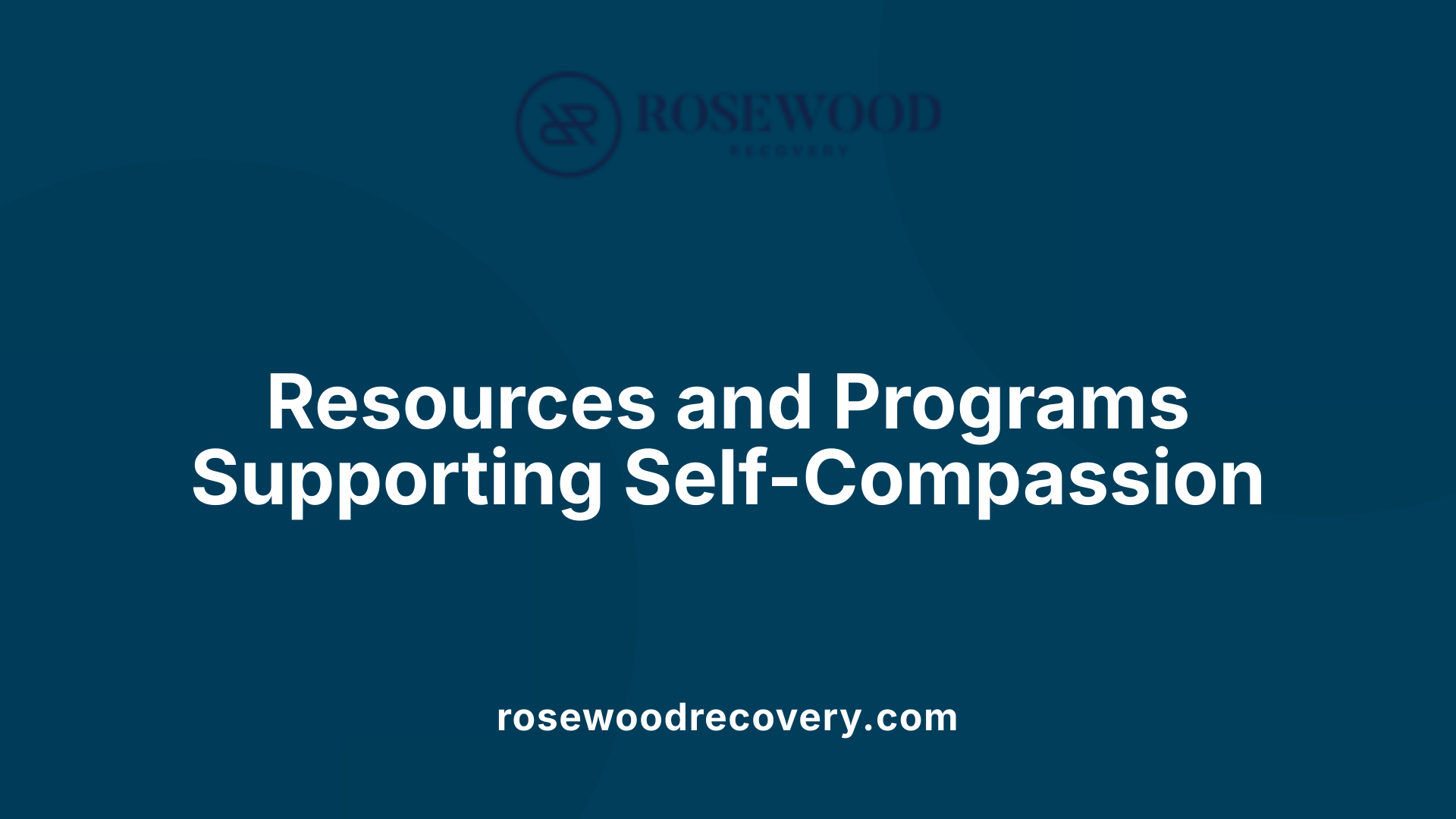
How do specialized resources like the Walker Center support self-compassion in recovery?
Specialized resources such as the Walker Center offer free guides and support tailored to developing self-compassion during addiction recovery. These materials often include practical instructions on mindfulness practices, self-forgiveness exercises, and ways to cultivate kindness toward oneself. By providing accessible and well-structured content, such resources empower individuals to consistently practice self-compassion outside of clinical settings.
How is self-compassion integrated into recovery program curricula?
Recovery programs incorporate self-compassion through activities like cognitive behavioral therapy (CBT), mindfulness meditation, and peer support groups. For instance, Alcoholics Anonymous (AA) and Narcotics Anonymous (NA) include self-compassion practices such as prayer, sharing experiences, and making amends. Treatment centers like Driftwood Recovery and the Treatment and Training Center (TTC) embed self-compassion techniques into personalized care plans. This systematic inclusion ensures that participants learn to manage negative emotions with kindness, improving their emotional regulation and resilience.
What are the benefits of having accessible self-compassion support materials for long-term recovery?
Accessible support materials contribute significantly to sustaining recovery by offering continuous encouragement and instruction for self-compassion practices. They help reduce feelings of shame, guilt, and self-criticism that commonly lead to relapse. Furthermore, such materials promote building recovery capital by enhancing social, human, and spiritual resources necessary for long-term wellness. The ongoing availability of these tools supports motivation, self-esteem, and the development of a positive mindset, ensuring individuals remain equipped to handle challenges throughout their recovery journey.
| Resource/Program | Integration Method | Impact on Recovery |
|---|---|---|
| Walker Center | Free guides and online support | Enhances self-compassion practice at home, fosters resilience |
| AA and NA | Prayer, experience sharing, making amends | Reduces shame, increases social connectedness |
| Treatment Centers (e.g., TTC, Driftwood Recovery) | CBT, mindfulness, peer support, personalized care | Improves emotional regulation and self-kindness |
These initiatives demonstrate how structured yet accessible approaches to cultivating self-compassion serve as vital components in supporting sustained recovery from substance use disorders.
Research Gaps and Future Directions in Studying Self-Compassion and Self-Forgiveness in Recovery
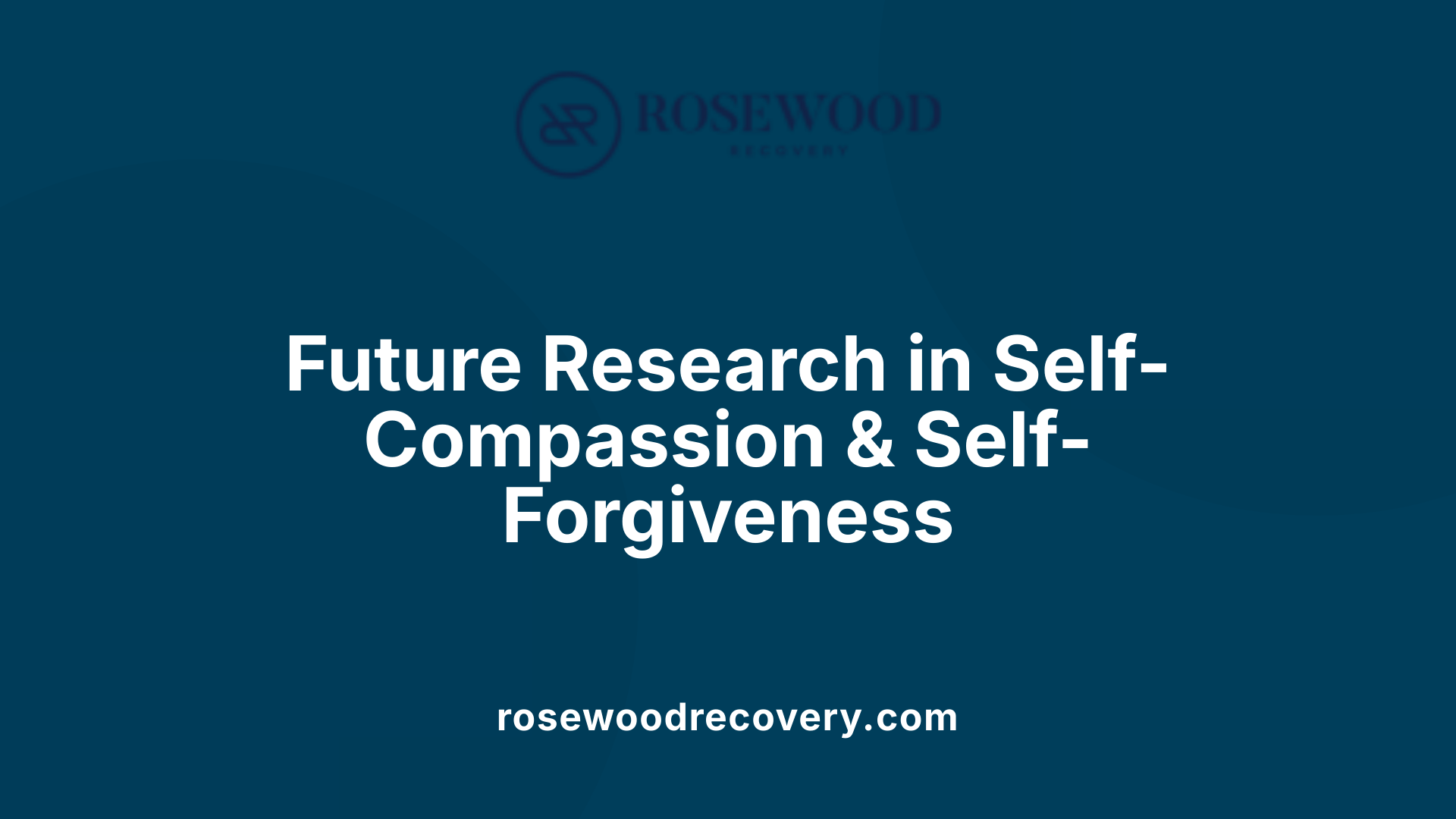
Why is there a need for longitudinal and experimental studies?
Current research on self-compassion and self-forgiveness in addiction recovery relies heavily on self-report measures and cross-sectional designs. This makes it difficult to establish clear causal relationships and understand how these factors evolve over time. Longitudinal and experimental studies are essential to uncover the mechanisms by which self-compassion and self-forgiveness exert their effects. They allow for tracking changes through recovery phases and testing targeted interventions under controlled conditions.
What is the status of evidence on the effectiveness of self-compassion interventions?
Evidence supporting self-compassion interventions in addiction recovery is still limited. Although research suggests self-compassion promotes adaptive emotion regulation and lowers psychological distress, few studies have rigorously tested self-compassion-based therapies or programs in clinical settings for substance use disorders. This gap calls for more trials assessing how integrating self-compassion enhances treatment outcomes and supports sustained sobriety.
Why examine the combined effects of self-compassion and self-forgiveness?
Only one study has simultaneously analyzed self-compassion and self-forgiveness in the same sample, indicating a need to explore their joint impact. Both constructs independently appear to reduce shame, promote positive affect, and lower problematic drinking. Investigating their combined influence could reveal synergistic benefits and guide comprehensive intervention strategies addressing multiple facets of emotional coping in recovery.
Why are objective measures needed beyond self-report?
Most existing findings stem from subjective self-report instruments, which can be biased or influenced by social desirability. Incorporating objective and behavioral measures—such as physiological assessment of stress responses, neuroimaging, or ecological momentary assessment—would strengthen evidence quality. This approach enhances understanding of how self-compassion and self-forgiveness manifest in real-world recovery scenarios and their true impact on relapse prevention and mental health.
Future research should prioritize these directions to rigorously evaluate and harness the therapeutic potential of self-compassion and self-forgiveness in addiction recovery frameworks.
Transforming Negative Emotions Into Positive Ones: The Conceptual Model of Self-Compassion in Recovery
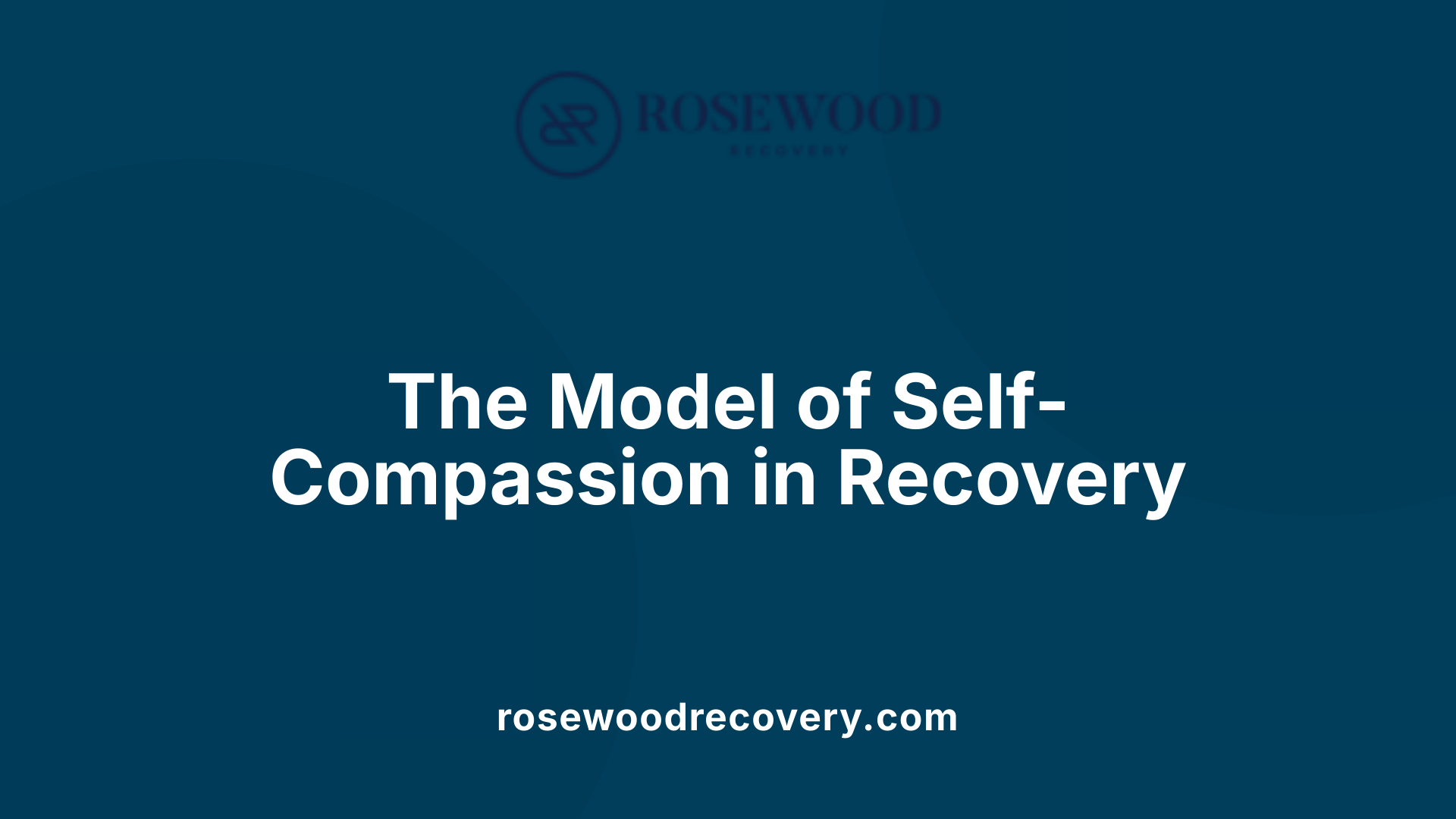
How does the model suggest self-compassion facilitates building recovery capital?
The conceptual model of self-compassion in recovery highlights its critical role in fostering recovery capital—an aggregate of personal and social resources vital for successful long-term recovery. Self-compassion encourages individuals to treat themselves with kindness, understanding, and awareness of common humanity during moments of distress. This emotional stance supports the development of recovery capital, which includes social, human, spiritual, and cultural resources.
By embracing self-kindness and mindfulness, individuals can reduce feelings of shame and self-criticism that often undermine motivation. The reduced self-stigma enhances their ability to build supportive networks, seek help, and maintain engagement in recovery activities, all essential components of recovery capital.
What role does self-compassion play in initiating and maintaining long-term recovery?
Self-compassion acts as a foundational emotion-regulation strategy at both the beginning and throughout the recovery journey. Early recovery often involves grappling with setbacks and cravings tied to negative emotions. Through self-compassion, individuals develop patience and self-forgiveness that allow them to view these challenges without harsh judgment.
This positive emotional approach reduces psychological distress, fosters resilience, and encourages continual commitment to recovery. Practices embedded in recovery programs, such as mindfulness and sharing experiences in groups like AA and NA, utilize self-compassion to sustain motivation and social connectedness crucial for long-term sobriety.
How does self-compassion broaden cognitive and emotional resources through positive affect transformation?
One of the model's core insights is that self-compassion transforms negative emotions into positive ones, broadening individuals’ cognitive and emotional capacities. Positive emotions generated by self-compassion—such as hope, kindness, and acceptance—expand attention, creativity, and problem-solving skills.
This broadened perspective helps people recover from adverse experiences more effectively, allowing them to develop adaptive coping strategies and build resilience. Consequently, these enriched emotional and cognitive resources serve as a protective buffer against relapse and support ongoing recovery efforts.
Together, these processes underscore self-compassion as a vital mechanism that not only alleviates suffering but also actively builds the internal and external resources necessary for a sustainable recovery journey.
Promoting Resilience and Emotional Well-being as Foundations for Sustained Sobriety
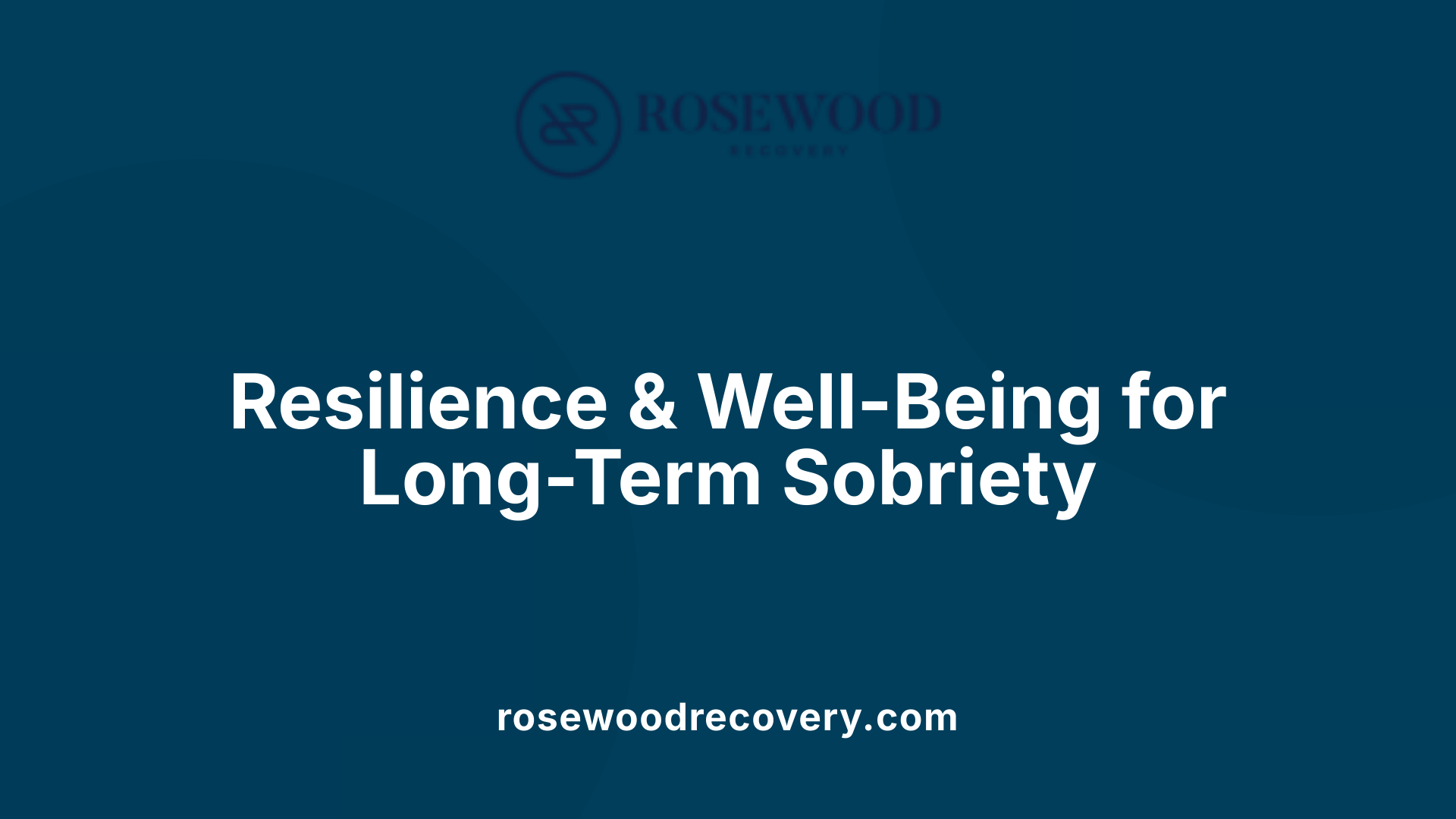
How Does Building Resilience Help Individuals Bounce Back From Setbacks and Relapse?
Building resilience through self-compassion equips individuals to face setbacks or relapses with kindness and patience rather than harsh self-criticism. This approach reduces feelings of shame and supports emotional recovery, enabling a person to view challenges as opportunities for growth rather than failures. Resilience fosters a sustainable approach to recovery by helping individuals manage cravings, triggers, and difficult emotions without discouragement.
How Can Self-Compassion Foster Self-Confidence, Self-Esteem, and Self-Worth During Recovery?
Self-compassion encourages treating oneself with kindness, understanding, and empathy, which can greatly reduce self-criticism and shame commonly experienced in addiction recovery. By focusing on strengths instead of weaknesses and practicing forgiveness for past mistakes, individuals cultivate greater self-confidence and self-worth. This positive self-view is crucial for maintaining motivation and embracing new goals.
Why Is Emphasizing a Positive Mindset Important Throughout the Recovery Journey?
A positive mindset sustained by self-compassion helps transform negative emotions into positive ones, fostering hope and motivation. Celebrating small progress, practicing gratitude, and refraining from comparing oneself to others further support emotional well-being. This mindset improves mental health, encourages patience, and nurtures the patience needed to endure the gradual process of recovery.
Together, these aspects of resilience and emotional well-being provide a strong foundation for sustained sobriety by promoting adaptive emotion regulation, reducing harmful self-talk, and fostering social connectedness. Integrating self-compassion practices—such as mindfulness, journaling, and engagement in support communities—can enhance these benefits throughout the recovery process.
Self-Compassion: A Cornerstone for Healing and Sustained Recovery
The journey to recovery from substance use and mental health challenges is multifaceted, demanding treatment that addresses not only physical dependency but also psychological and social complexities. Self-compassion, by encouraging kindness, mindfulness, and shared humanity, emerges as a crucial psychological resource that nurtures emotional resilience, reduces shame, and supports adaptive coping. Integrated within comprehensive treatment programs, behavioral therapies, support groups, and self-care practices, self-compassion fosters recovery capital essential for long-term wellness. It equips individuals with the patience and motivation to navigate setbacks, rebuild relationships, and maintain sobriety. Future research and treatment innovation hold promise for expanding the role of self-compassion and self-forgiveness in recovery, ultimately enriching the pathways toward lasting healing and improved quality of life.
References
- The Role of Self-Compassion in Recovery from Substance ...
- The Role of Self-Compassion in Early Recovery from ...
- Self-Compassion During Addiction Recovery
- Self-Compassion and Self-Forgiveness in Alcohol Risk ...
- The Predictive and Mediating Role of Self-Compassion in ...
- How Can I Practice Self-Compassion During My Addiction ...
- The Role of Self-Compassion in Recovery from Substance ...
- The Importance of Patience and Self-Compassion in ...




